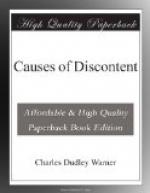However the lines social and political may be drawn, we have to keep in mind that nothing in one class can be foreign to any other, and that practically one philosophy underlies all the movements of an age. If our philosophy is material, resulting in selfish ethics, all our energies will have a materialistic tendency. It is not to be wondered at, therefore, that, in a time when making money is the chief object, if it is not reckoned the chief good, our education should all tend to what is called practical, that is, to that which can be immediately serviceable in some profitable occupation of life, to the neglect of those studies which are only of use in training the intellect and cultivating and broadening the higher intelligence. To this purely material and utilitarian idea of life, the higher colleges and universities everywhere are urged to conform themselves. Thus is the utilitarian spirit eating away the foundations of a higher intellectual life, applying to everything a material measure. In proportion as scholars yield to it, they are lowering the standard of what is most to be desired in human life, acting in perfect concert with that spirit which exalts money making as the chief good, which makes science itself the slave of the avaricious and greedy, and fills all the world with discontented and ignoble longing. We do not need to be told that if we neglect pure science for the pursuit of applied science only, applied science will speedily be degraded and unfruitful; and it is just as true that if we pursue knowledge only for the sake of gain, and not for its own sake, knowledge will lose the power it has of satisfying the higher needs of the human soul. If we are seen to put only a money value on the higher education, why should not the workingman, who regards it only as a distinction of class or privilege, estimate it by what he can see of its practical results in making men richer, or bringing him more pleasure of the senses?
The world is ruled by ideas, by abstract thought. Society, literature, art, politics, in any given age are what the prevailing system of philosophy makes them. We recognize this clearly in studying any past period. We see, for instance, how all the currents of human life changed upon the adoption of the inductive method; no science, no literature, no art, practical or fine, no person, inquiring scholar, day laborer, trader, sailor, fine lady or humblest housekeeper, escaped the influence. Even though the prevailing ethics may teach that every man’s highest duty is to himself, we cannot escape community of sympathy and destiny in this cold-blooded philosophy.
No social or political movement stands by itself. If we inquire, we shall find one preponderating cause underlying every movement of the age. If the utilitarian spirit is abroad, it accounts for the devotion to the production of wealth, and to the consequent separation of classes and the discontent, and it accounts also for the demand that all education shall be immediately useful. I was talking the other day with a lady who was doubting what sort of an education to give her daughter, a young girl of exceedingly fine mental capacity. If she pursued a classical course, she would, at the age of twenty-one, know very little of the sciences. And I said, why not make her an intellectual woman? At twenty-one, with a trained mind, all knowledges are at one’s feet.




